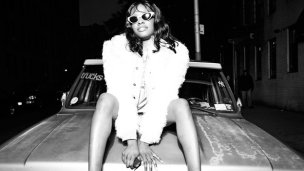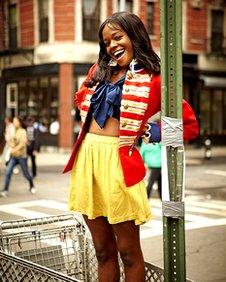Sound of 2012: Azealia Banks
- Published
Azealia Banks revisits her musical theatre roots in London's West End
Foul-mouthed New York rapper (and former stage-school student) Azealia Banks takes third place in the BBC's Sound Of 2012 new music list.
The list, compiled using tips from more than 180 tastemakers - made up of music critics, editors, broadcasters and bloggers - aims to highlight some of the most exciting emerging artists. We are revealing one artist from the top five in reverse order every day until Friday, when the winner will be announced.
"I'm the rap Larry David. Always complaining."
So said Harlem-born 20-year-old Azealia Banks, writing to her fans on Twitter, external last month.
"It's true," she laughs after being reminded of the message. "I'm always nagging!"
"It's just my personality - I'm a bit of a misanthrope. Especially now, because I'm an artist. These fake people are all up in your face with their antics. And you're just like, 'uhhh.'"
The feeling has been amplified since September when Banks uploaded 212, a foul-mouthed ode to oral sex, to YouTube.
Gwyneth Paltrow and Kelly Rowland have been raving about it, but the song has also brought Banks to the attention of journalists.
It would be fair to say she's not taken too kindly them. Particularly the men.
"[They] hear the music and think it's a green light to ask you all of these questions about your sexuality. The actual details. Weirdoes.
"It's like, get the hell out of my face. You just want to punch someone."
In print, Banks can come across as petulant and aggressive, but in person she's charming.
All sass and chuckles, she chatters away through a gap-toothed, rubber band smile, every paragraph punctuated by the question, "You know what I'm saying?"

The rapper says her background in drama helps her go to places other artists shy away from
Larry David was never this personable.
Banks's music walks a similar tightrope - balancing cheeky humour with a string of profanities, like Tarantino dialogue set to house music.
The rapper actually started out as a drama student at Manhattan's famous LaGuardia High School, which counts Liza Minnelli, Al Pacino and fellow rapper Nicki Minaj among its alumni.
Aged 16, she starred in a production of City Of Angels, playing a dramatic role which required her to die on stage every night. Simultaneously, she was experimenting with rap - releasing a song called Seventeen, under the pseudonym Miss Bank$.
That record, a true-life story of her relationship with an older man, caught the attention of UK record label XL, who promptly signed her to a deal.
Looking back, Banks admits that music was still "kind of a hobby" at the time.
"But a hobby I was very willing to throw myself into, you know?"
The youngster believed that XL president Richard Russell - "he was this really cool guy" - could turn her into a "superstar", much as he had done with MIA and Adele, but things quickly turned sour.
"It was almost the day I signed to XL that they started checking out," she recalls.
"There were a good seven to eight months where I was just sending them texts and no-one would say anything or pick up the phone or respond to my emails. Nothing. And it started to ruin me.
"So I started harassing Richard. Like, 'Dude, I'm going to chop your neck off. Answer my emails!'"
When Russell finally got in touch, Banks says, it was to give a lukewarm response to a track she had just written - and that track was 212.
"So I was like, this is not what I worked so hard my entire life to do - to be rejected by some English guy in West Bumblefrickin' nowhere London, telling me I'm amateur or something like that.
"So I just said, 'Screw you!'"
The rejection suddenly fuelled her musical ambition. She disappeared to Montreal, Canada, and started laying down the demos that will, to some extent, form the basis of her debut album.
"It was a period of enlightenment," she says. "I realised that my life will only be what I make it. If I accept defeat, I deserve defeat."
The new material is being recorded with British producer Paul Epworth - a man better known for his work with Adele than blunt, bratty rappers.
"I'm going to drag another side of Paul out," says Banks.
"I'm really DIY, and he's very polished. But you're definitely going see a darker side of Paul and a more refined side of me. That's what it has to be about."
Sexuality
As a result, the album will have bigger melodies and fuller arrangements than the stripped-back minimalism of Banks's YouTube tracks. But the fruity language won't be toned down.

A cover of Interpol's Slow Hands showed off Banks's singing talents
The rapper says her lyrics mirror the way she speaks to her friends. The swearing isn't meant to cause outrage, and even the sexualised 212 is meant to be inclusive.
"A lot of people aren't comfortable with their sexuality," explains Banks.
"There are women who are curious about other women and haven't had the courage to go there.
"One person said to me, 'When I listen to 212, I feel that someone understands me. I feel like I have a best friend telling me that all these things that I want to do are ok.'"
Banks doesn't just want to break sexual taboos, however. Liquorice, her next single, tackles inter-racial relationships.
"It is a taboo among black women to desire white men, and vice versa," she says.
"But if you read websites or magazines that are geared towards African-American women, we're very curious about white men. And the world is becoming so mixed up now, it's happening a lot more.
"The song is really funny and quirky. I feel like that will be the most exciting moment of my career so far."
Even more exiting than being shortlisted in the BBC's Sound Of poll?
"I don't want to be called the 'next big thing' because that implies there's another big thing after you.
"The media does a really good job of discarding artists - and it has a really big effect what people think about themselves. So I try to keep a lot of that talk out of my head.
"I'd rather be a dope artist that people are just starting to find out about."
And, with that grumble, the rap Larry David says goodbye - breaking into a raucous laugh as she goes.
- Published3 January 2012
- Published4 December 2011